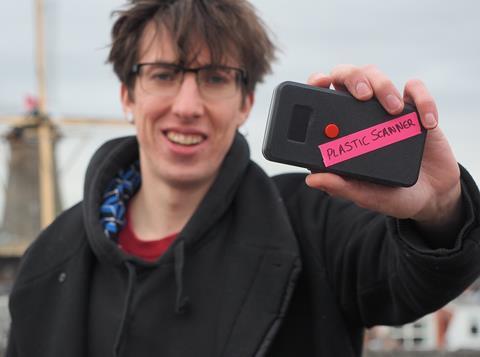The next of our Sustainability Awards 2021 finalist interviews is with Jerry de Vos, creator of Plastic Scanner - an open-source, low-cost device that he tells us can identify over 75% of all the plastics used by consumers around the world. This technology has been nominated in our 'Pre-Commercialized Innovation' category.
Congratulations on being selected by the international judging panel as a Sustainability Awards 2020 finalist! Could you please introduce your successful entry and what’s innovative about it?
The project that I submitted for the Sustainability awards which has been selected is the Plastic Scanner project. With the Plastic Scanner project, I am building a low-cost open-source scanner that is able to identify the most common types of plastic.
While all (packaging) manufacturers and recyclers around the world want to recycle plastic, it can often be challenging to sort plastic by chemical type. This is mandatory in order to create valuable products from recycled plastic. closing the circular loop. This device makes it easy to determine what type of plastic an item is made of, from there it can fully be recycled.
The plastic scanner has two especially innovative sides, firstly is the development of the discrete infrared technology. This dramatically cuts down the price compared to other commercial infrared spectroscopes and makes plastic identification accessible anywhere in the world, mainly focussed on low- and middle-income countries. The higher recycling rates in low- and middle-income countries are especially important since most of the plastic that enters the oceans comes from these places.
The second innovative side is that the project is fully open source, this means that all the information to replicate and build it yourself is open, online, for free. This way the innovation is fully transparent and makes building one super simple!
What are the environmental challenges in packaging that your entry addresses, and what impact do you hope it will make?
Even though we are trying to reduce the amount of plastic consumed, there is already an enormous amount of plastic, most of this plastic is never recycled. By providing people with the tools and infrastructure that simplify plastic recycling, it lowers the barier to start recycling plastic. It makes it more economically viable and allows for people to start from the bottom up. Especially in low- and middle-income countries, this has a big environmental impact since it directly improves their living surroundings and improves life on land and life underwater.
I’d like to ask you about the broader picture beyond your successful entry. ‘Sustainability’ in packaging is multi-dimensional – both in terms of objectives and challenges. Could you comment on the most important roadblocks you identify from your position in the value chain, and the kinds of solutions you would like to see addressing them (e.g. areas of technological innovation, collaboration, regulation)?
From setting up recycling facilities around the world with Precious Plastic, I have seen many different types of packaging. While some are easy to recycle, some are very challenging. Ultimately I would love to see a reduction in the number of different types of plastic used in packaging. Where certain products used to be made of 1 plastic type, you now see a scattering of different materials used, making recycling more difficult. On the other hand, you see a lot more packaging with the "unique selling point" that their packaging is fully recyclable, this often misleads the consumer in think that it is made from recycled material or it will be recycled, but sadly only a few percent of the packaging is actually recycled again into new packaging. A potential solution for this could be that producers of packaging take ownership of that packaging and are required to take back their packaging material, this forces them to make something that is simple to recycle.
At a higher level, I think we should research possibilities to step away from plastic packaging and look into biodegradable alternatives, not biobased alternatives. This won't be the solution to all packaging, but I do think that it can solve quite some of the waste problems of the short-term packaging.














